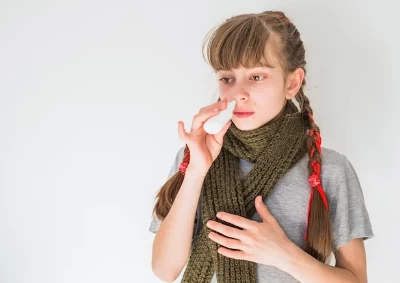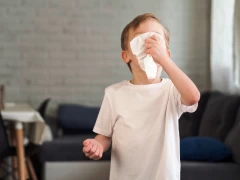
About Allergies in Children...
- About Allergies in Children...
- What is Allergy?
- Allergies in Children
- What is the reason behind the increasing prevalence of allergic diseases?
- When should we consider allergy? Is it a cold or allergic rhinitis?
- What types of cough suggest allergy?
- Children in their first year of preschool get sick very often. What recommendations do you have for these children?
- How do you diagnose allergies?
Before starting with the question-answer format on allergies in children, let me provide a definition of allergy.
What is Allergy?
Allergy is an immune system's exaggerated response to substances that are normally harmless. When the immune system of the body recognizes certain substances, known as allergens, which are typically not harmful, it produces protective responses against them. However, in individuals with allergies, the immune system overreacts to these harmless substances, considering them as potential threats and causing adverse reactions.
Now let's move on to the Q&A section about allergies in children:
Allergies in Children
What is the reason behind the increasing prevalence of allergic diseases?
Allergies arise from the immune system's excessive reactions to proteins that should not normally trigger responses. Considering how far we have moved away from a healthy and natural lifestyle, it is not surprising to witness such a justifiable rebellion from our immune systems.
Factors such as urbanization due to migration from rural to urban areas, unhealthy and processed diets, air pollution, stressful modern lifestyles, and the increasing use of chemical-laden products are some of the contributors to the rise in allergic conditions.
When should we consider allergy? Is it a cold or allergic rhinitis?
If symptoms include fatigue, weakness, fever, muscle aches, and intense sore throat, it is more likely to indicate an infection. On the other hand, prolonged nasal congestion, consecutive sneezing episodes, nasal itching, clear nasal discharge, watery and itchy eyes point towards allergic rhinitis. However, it is essential to emphasize that proper evaluation and diagnosis by a medical professional should always be prioritized.
What types of cough suggest allergy?
If the cough is persistent, more frequent at night, and worsens with activities like exercise, crying, or laughing, allergy should be considered. Allergic cough can manifest as dry and intermittent or with intense mucus production. Especially in children exposed to frequent antibiotic use, it is crucial to examine the underlying presence of allergic diseases. Addressing the issue correctly can prevent unnecessary medication usage.

Children in their first year of preschool get sick very often. What recommendations do you have for these children?
Ensuring a balanced and natural diet, as well as sufficient and quality sleep, should be prioritized. When children step outside their homes for the first time and encounter crowded environments with numerous infectious agents, their immune systems face an increased challenge in fighting off various illnesses. However, some children may possess a genetic predisposition to allergies or have immune system deficiencies, making this period more challenging for them. It is crucial to perform a thorough evaluation for allergic diseases and immune function in these cases.
Children who:
- Frequently require antibiotics,
- Experience prolonged cough during colds,
- Have lower respiratory tract problems, or
Face disruptions in school attendance due to illnesses, will benefit from appropriate preventive treatments, which can reduce the need for frequent antibiotic use and improve their overall school experience.
How do you diagnose allergies?
The medical history of the patient provides valuable information in the first step. During the examination, evaluations of the nose and lungs shed light on the diagnosis. Allergy skin tests can quickly determine which substances trigger an exaggerated response. By identifying substances like house dust, pollen, cat or dog dander, mold spores, that are in harmony with the test results, we gain insight into the cause of the allergy. Allergy tests have no age limit for food evaluations, but for respiratory allergens, we prefer children to be at least 2 years old. However, it is crucial to remember that in younger children experiencing frequent cough and wheezing attacks, initiating protective treatment without the need for testing is essential. In appropriate age groups, respiratory function tests provide information about lung capacity and can assist in diagnosing conditions like asthma.






